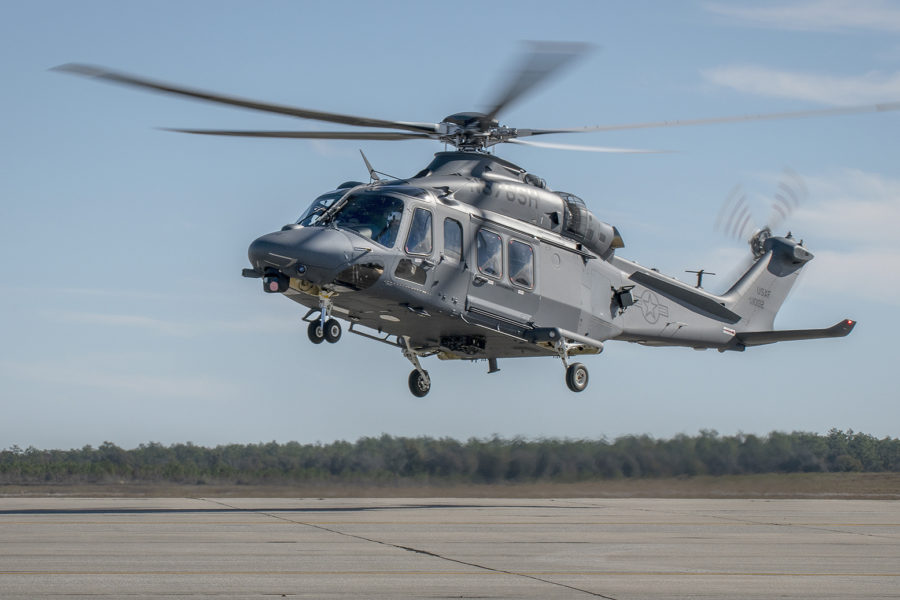While the Pentagon is halfway through its review of the Air Force’s new Sentinel intercontinental ballistic missile (ICBM) program in the wake of “critical” cost and schedule overruns, the service has declared a similar issue for the helicopters meant to provide security and transport across those ICBM fields.
The Air Force recently notified Congress of a “critical” Nunn-McCurdy breach on the MH-139 Grey Wolf program, a spokesperson confirmed to Air & Space Forces Magazine. The Nunn-McCurdy Act requires the Pentagon to inform lawmakers if a program incurs a cost or schedule overrun of more than 15 percent.
Any breach over 15 percent is considered “significant,” while a breach of 30 percent is considered “critical.” Programs with a critical breach require certification from the Secretary of Defense to continue.
Rep. Ken Calvert (R-Calif.), chair of the House Appropriations defense subcommittee, first revealed the MH-139 breach during an April 30 hearing, noting the ongoing Sentinel breach as well.
“We need to understand the implications of both of these breach reviews for fiscal year 2025 and beyond,” he said.
While the Sentinel breach was related to ballooning costs and years of delays, the MH-139 breach was caused by the Air Force’s decision in its 2025 budget request to slash the projected fleet from 80 to 42 aircraft—which caused the price per aircraft to rise significantly. Overall procurement costs, however, dropped $1.1 billion.
The cuts to the MH-139 came “due to fiscal pressures and considering remaining service life of the UH-1N Huey,” an Air Force spokesperson previously told Air & Space Forces Magazine.
The Air Force had planned to have the MH-139 provide transport for senior leaders, executive airlift in the National Capital Region, and aircrew survival training in addition to its ICBM patrol duties. With the cuts, the service now says the Grey Wolf will only be used by nuclear security forces.
A militarized version of the AW139 helicopter, the MH-139 can fly faster, higher, farther, and with more weight than the UH-1N, which Air Force budget documents say have “significant capability gaps in the areas of speed, range, endurance, payload capacity, and aircraft self-protection.”
However, issues with Federal Aviation Administration (FAA) certification several years ago caused the Air Force to delay purchases, and the Pentagon’s Office of the Director of Operational Test & Evaluation (DOT&E) has warned in its annual report that the Grey Wolf might fall shore of “operational effectiveness requirements.”
Now, the office of the undersecretary of defense for acquisition and sustainment must conduct a review of the program to certify that:
- The program is essential to national security.
- The root cause of the overrun is clearly understood.
- New cost estimates are validated by the Pentagon’s Cost Assessment and Program Evaluation shop as reasonable.
- There are no lower-cost alternatives to the program.
- The program is a higher priority than other programs that must be reduced or eliminated to pay for the overrun.
Sentinel Review to Finish by July
While the MH-139 Nunn-McCurdy process is just beginning, the Sentinel ICBM program has been in it since January and is now “halfway” done, Undersecretary of Defense for Acquisition and Sustainment William LaPlante told lawmakers in a separate April 30 hearing.
Under the law, LaPlante noted, his office has 120 days after the submission of the President’s budget to complete its review.
“So that deadline for us, roughly is July 10 or so,” he said.
While Air Force leaders have repeatedly said they believe Sentinel must continue to replace the aging Minuteman III missiles that have been in service since the 1970s, LaPlante said no outcomes are being ruled out of the review process, including the program being canceled or certified to continue with modifications.
LaPlante declined to share any preliminary findings from the review, but he did note that, in his own opinion, the Sentinel program suffered from poor communication between the prime contractor Northrop Grumman and its subcontractors, a lack of competition for the contract, and massive costs associated with the ground element. On the last point, Air Force officials have also noted that because Minuteman was put into service so long ago, its basic infrastructure needs to be massively overhauled, and the Air Force and industry have no recent experience with a project of that size.
LaPlante also noted issues with Sentinel’s integrated master schedule, or lack thereof. When he started in the summer of 2022, he visited Hill Air Force Base and determined the program lacked a reliable master schedule, nearly two years after the Air Force had awarded an Engineering and Manufacturing Development contract to Northrop.
“By the time you’re six months after a Milestone B [decision], you should have an integrated master schedule,” LaPlante said.
